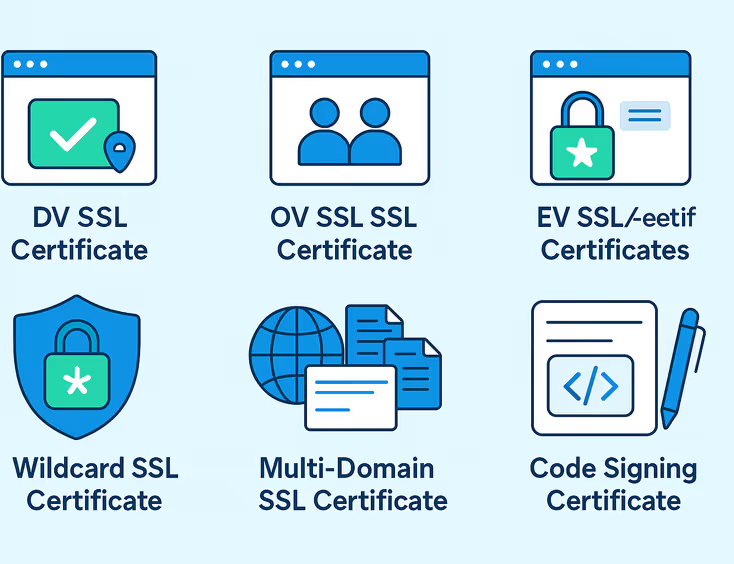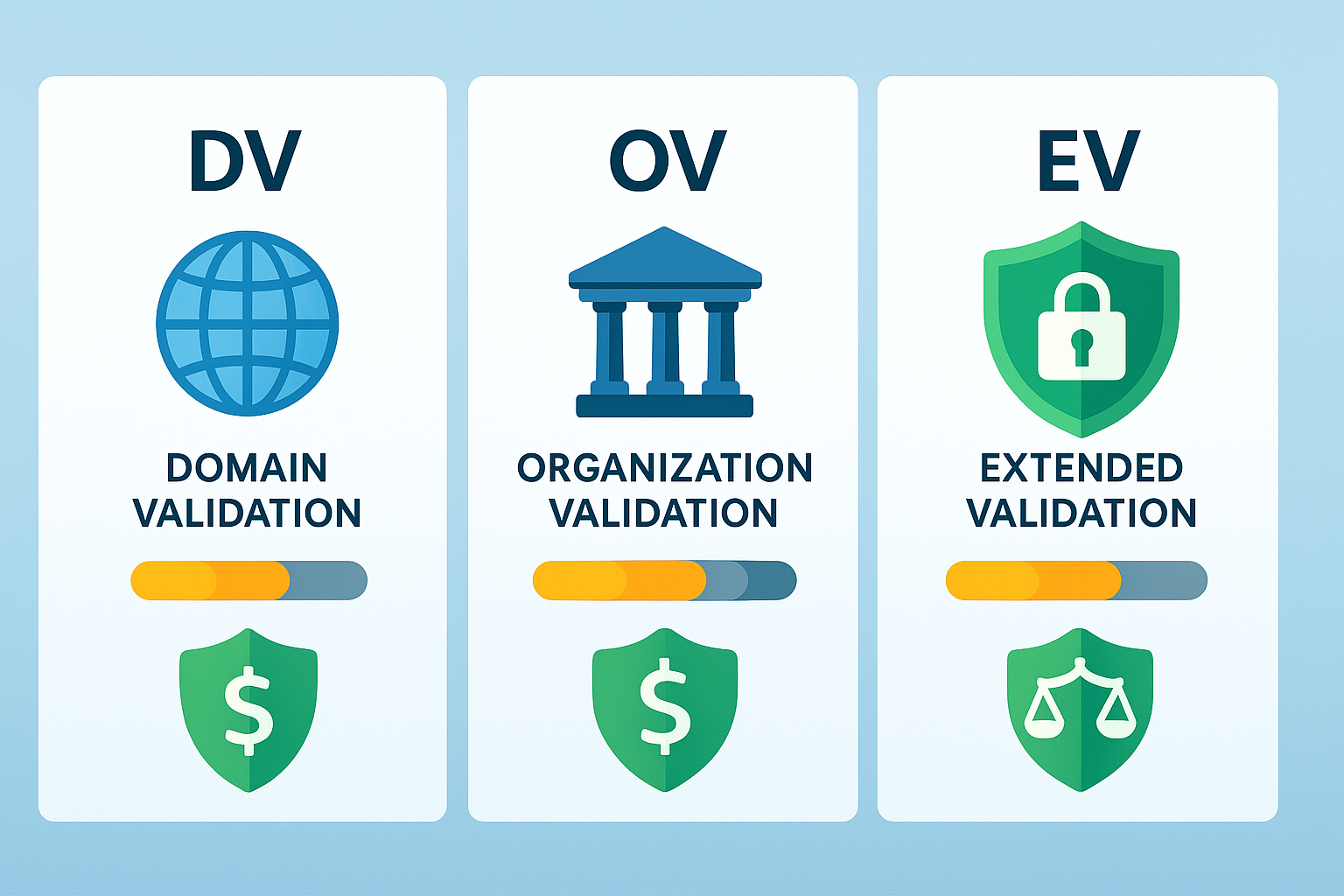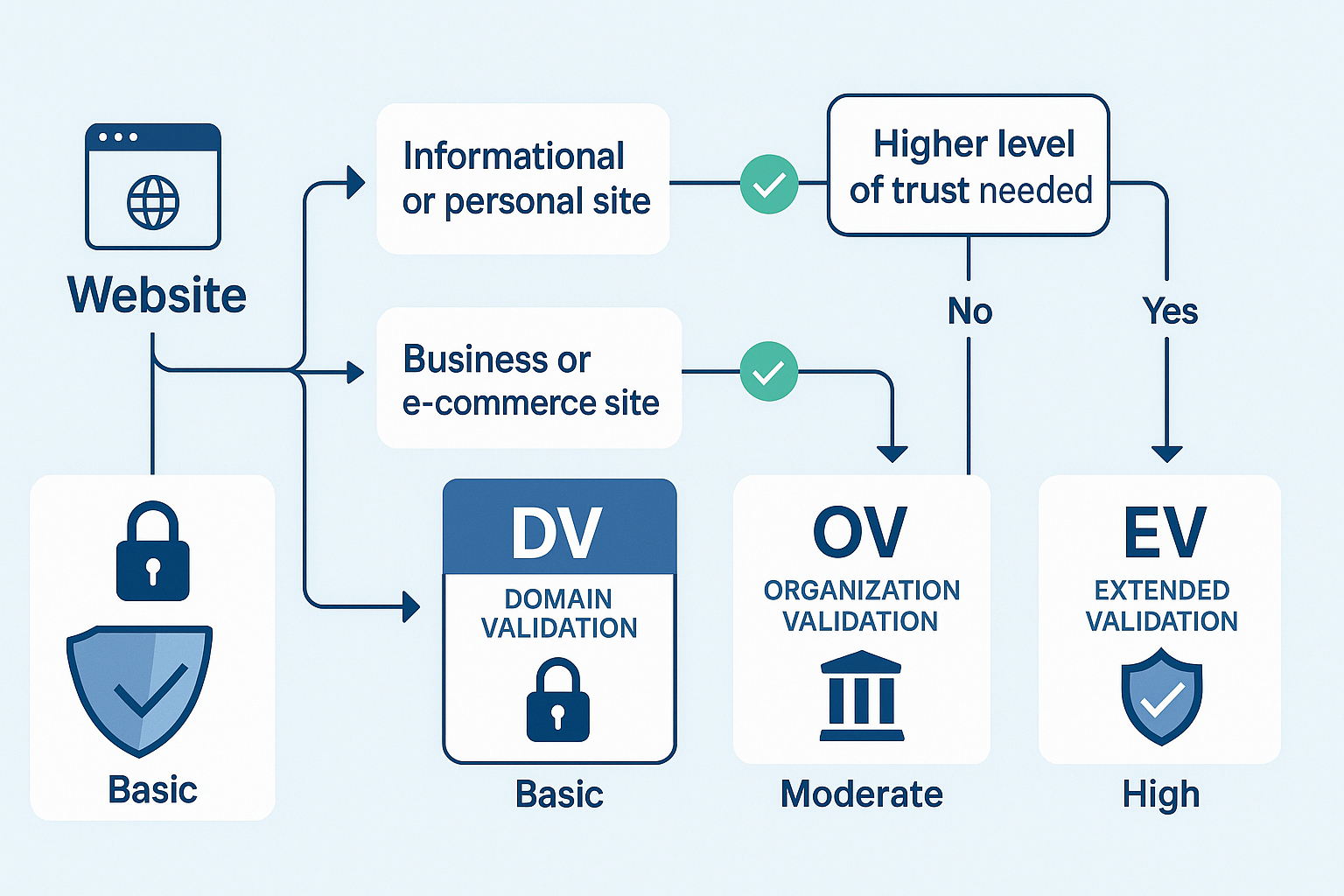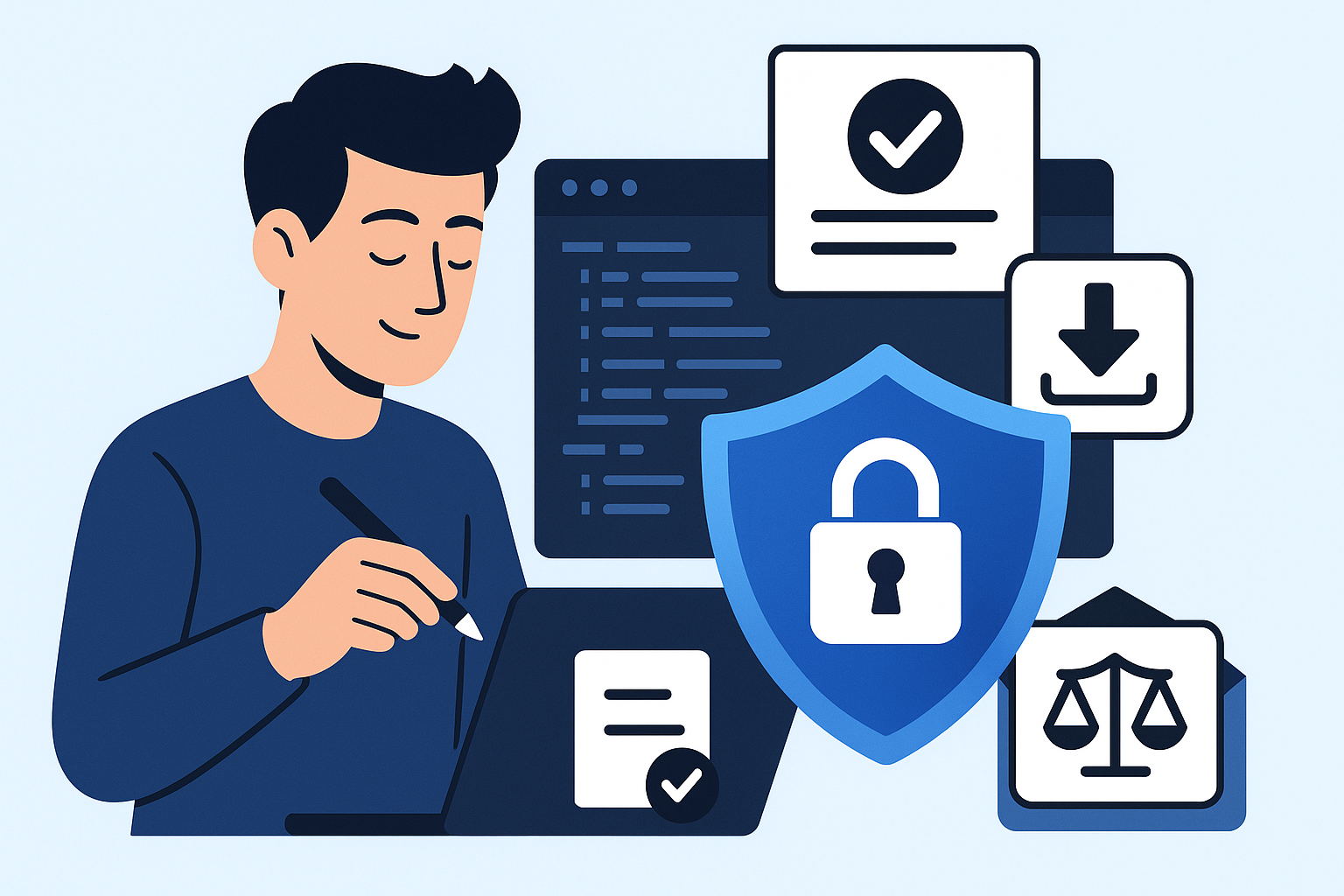
What are the different types of SSL certificates?

There are three main types of SSL/TLS certificates available today:
- Domain Validated (DV)
- Organization Validated (OV)
- Extended Validation (EV)
All three use the same encryption strength. What sets them apart is the rigor of their vetting and verification process.
Over the past few years, SSL/TLS adoption has skyrocketed. Its use has expanded beyond simple website encryption to encompass broader applications such as:
- Ensuring privacy of communication (preventing eavesdropping)
- Validating the identity of the server you’re connecting to
While encryption protects data from being read, it doesn’t prevent attackers from impersonating a trusted website. That’s why verifying identity is essential. Third-party validation by a Certificate Authority (CA) like GlobalSign helps confirm your legitimacy online.
Extended Validation (EV SSL) Certificates
An EV certificate undergoes the most rigorous vetting process, following formal guidelines established by the CA/Browser Forum since 2007. Before issuing:
- The CA verifies the legal, physical, and operational existence of the business.
- It confirms that the business identity matches official records.
- It ensures the applicant has exclusive rights to the domain.
- It checks that the certificate issuance is fully authorized by the entity. :contentReference[oaicite:1]{index=1}
Modern browsers display EV certificates with enhanced visual indicators—such as green address bars or business name display—on browsers like Internet Explorer 7+, Chrome, Firefox 3+, and Safari. :contentReference[oaicite:2]{index=2} This makes EV the ideal choice for organizations needing the highest level of trust.
EV certificates are available to all registered businesses, including government entities. Issuing CAs must pass thorough annual audits under EV Audit Guidelines to retain certification integrity. :contentReference[oaicite:3]{index=3}
Organization Validated (OV SSL) Certificates
An OV certificate provides a strong layer of assurance:
- The CA confirms domain ownership and performs basic organizational vetting.
- When users click the Secure Site Seal, they'll see verified company information.
- The organization’s name is included in the certificate (the “O” field). :contentReference[oaicite:4]{index=4}
This builds user trust by showing that a legitimate organization stands behind the site.
Domain Validated (DV SSL) Certificates
A DV certificate validates only domain ownership—no organizational vetting is performed.
- It secures data transmission with full encryption and browser recognition.
- Issuance is nearly instantaneous, often within minutes.
- Ideal for websites needing fast, cost-effective encryption without formal identity verification. :contentReference[oaicite:5]{index=5}
The Secure Site Seal shows only that the connection is encrypted, not who is behind it.

Product Options and Features
DomainSSL (DV)
- Fast & economical
- $10,000 warranty
- 7‑day refund
- Issued within minutes
- No paperwork required
OrganizationSSL (OV)
- High assurance
- $1.25 million warranty
- 7‑day refund
- Includes organization identity in certificate
ExtendedSSL (EV)
- Highest assurance level
- $1.5 million warranty
- 7‑day refund
- Displays enhanced trust indicators to users
Multi‑Domain & Wildcard SSL
- Flexible coverage
- Secure multiple domains or subdomains with one certificate and a single IP
- Supports Wildcard and Subject Alternative Names (SANs)

Why Choose Different SSL Types?
Align your SSL choice with your needs:
| Feature | DV SSL | OV SSL | EV SSL |
|---|---|---|---|
| Encryption Strength | ✅ Same | ✅ Same | ✅ Same |
| Vetting Level | Domain only | Domain + Org | Domain + Org + Legal |
| Issuance Time | Minutes | 1–2 days | Several days |
| Trust Displayed | Encryption only | Company info | Fully authenticated UI in browser |
| Warranty | $10K | $1.25M | $1.5M |
When to Use Each
- DV: Quick, budget-friendly encryption (e.g., blogs, small informational sites).
- OV: Requires organizational trust (e.g., SMEs, user logins, e-commerce).
- EV: Highest level of online trust (e.g., financial services, large enterprises, transactions).
Wildcard SSL Certificates
A Wildcard SSL Certificate is ideal for securing a domain and all its subdomains using a single certificate. For example, a Wildcard for *.yourdomain.com will secure:
www.yourdomain.commail.yourdomain.comlogin.yourdomain.com- and any other subdomain.
Key Features:
- Cost-effective: Instead of buying separate certificates for each subdomain, one Wildcard covers all.
- Simplifies Management: Update or renew just one certificate instead of many.
- Flexible: Add new subdomains any time without needing to reissue the certificate.
Note: Wildcard SSLs are generally available in DV and OV types, but not in EV due to the strict validation requirements of Extended Validation.
Multi-Domain (SAN) SSL Certificates
A Multi-Domain SSL Certificate (sometimes called SAN or UCC certificate) secures multiple, distinct domain names with a single certificate. You can use it to secure:
- Different websites:
example.com,example.net,myothersite.org - Both main domains and subdomains
Benefits:
- Simplifies SSL management for businesses with a broad online presence.
- Reduces costs and administrative overhead.
- Flexible expansion: You can add or change domain names covered by the certificate (within limits) as your needs evolve.
Multi-Domain SSLs can be combined with Wildcard support for even more coverage and flexibility.

Code Signing Certificates
Although not a type of website SSL, it’s important to mention Code Signing Certificates. These digital certificates:
- Authenticate the identity of software publishers
- Ensure that code (applications, drivers, executables) has not been altered since it was signed
End users can download or install software with confidence, knowing it comes from a trusted source and hasn’t been tampered with.
SSL Certificate Warranties
All reputable SSL certificates include a warranty. This financial protection covers end users against certain losses if they suffer damage due to a mis-issued certificate (for example, if the CA fails in its vetting process). Warranty amounts range from $10,000 for DV up to $1.5 million for EV, depending on the certificate type.
Frequently Asked Questions (FAQs)
1. Do all SSL certificates offer the same level of encryption?
Yes, all certificate types—DV, OV, and EV—offer the same high level of encryption. The difference is in how thoroughly the applicant’s identity is verified before the certificate is issued.
2. What is the fastest SSL certificate to obtain?
Domain Validated (DV) SSL certificates are the quickest to issue, often within minutes, since only domain control is verified.
3. How do browsers display different SSL types?
All SSL certificates activate HTTPS and show a padlock in browsers. EV certificates may trigger additional visual cues, such as displaying the organization’s name in the address bar for maximum trust.
4. Can individuals buy OV or EV SSL certificates?
No, OV and EV certificates are only available to legally registered organizations and businesses. Individuals can purchase DV certificates.
5. Do Wildcard certificates secure multiple domains?
No, Wildcard certificates secure an unlimited number of subdomains on a single domain (e.g., *.mydomain.com). For multiple domains, use a Multi-Domain (SAN) certificate.
6. Are SSL certificates required by law?
SSL is not always legally required, but regulations like GDPR, HIPAA, and PCI-DSS demand encryption for certain data, making SSL essential for compliance and user trust.
Choosing the Right SSL Certificate for Your Needs
Consider the following factors:
- Nature of your website: Informational sites may only need DV, while e-commerce and portals handling sensitive data should use OV or EV.
- Number of domains/subdomains: Use Wildcard or Multi-Domain SSL for broader coverage.
- Brand reputation: Higher validation certificates (OV/EV) communicate legitimacy and foster user trust.
Why Choose a Trusted Certificate Authority?
Your certificate is only as trustworthy as the authority that issues it. Always choose an established, WebTrust-audited Certificate Authority (CA) that meets or exceeds industry standards for security, validation, and support. This ensures:
- Strong, up-to-date encryption
- Adherence to best practices and compliance standards
- Responsive, expert customer support
- Seamless browser and device compatibility
Final Thoughts
Selecting the right SSL certificate protects your website, customers, and reputation. As cyber threats continue to evolve, prioritizing both encryption and identity verification is more important than ever. For organizations serious about security and trust, moving beyond basic encryption to strong, verified SSL is a smart investment.
Need further advice or guidance on SSL types and best practices? Consider consulting with a leading Certificate Authority or IT security expert to assess your organization’s specific needs.





